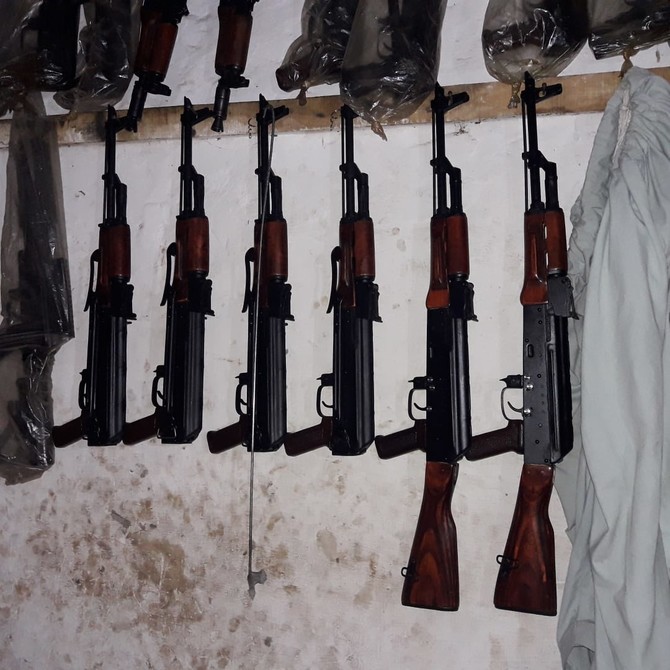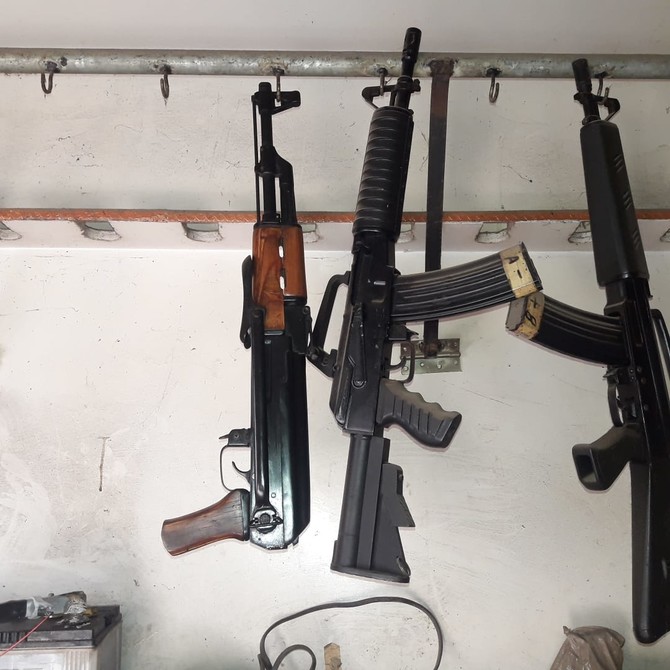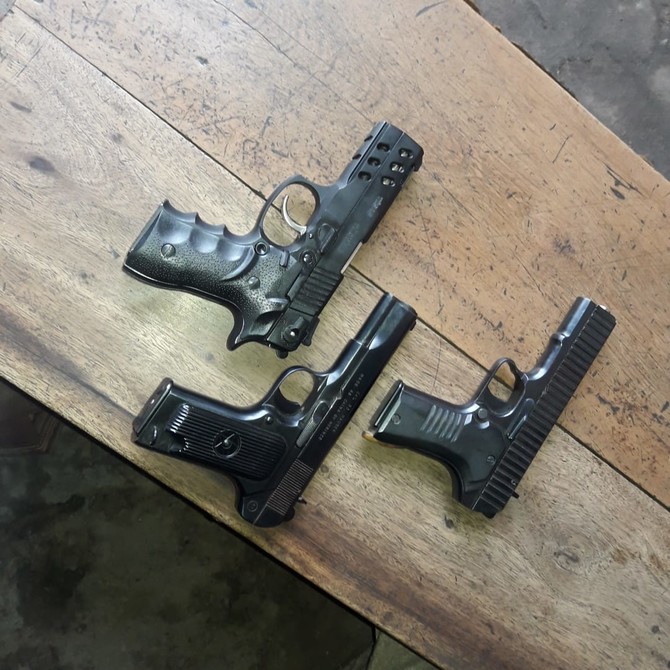DARA ADAM KHEL: It’s all guns and no roses for the shop owners of the weapons market that lines the bazaar in the dusty hamlet of Dara Adam Khel.
Inhabited by the Afridi tribe, the market has become the core identity of Dara Adam Khel — an area located between Kohat and Peshawar to the south of the Khyber Pakhtunkhwa province.
On any given day, it is packed with traders and merchants who have gained recognition for the quality and range of their guns and ammunition, with a number of tribesmen starting their businesses from scratch and soldiering on to become millionaires.
During an extensive range of interviews, where they spoke exclusively to Arab News, a majority shied away from taking credit for their craft, reasoning that they were only paying homage to skills passed on by their ancestors by taking the business forward.
Dating back to the pre-independence era of Pakistan, ancestors of these tribesmen — during their armed expedition in large swathes of Asia — learned the skills, passing it on to the future generations who developed it into a full-fledged arms industry in the Khyber tribal region.
Today, 40,000 to 50,000 residents of the area – with a total population of 110,000 — are directly associated with the industry, with every second owner saying that he inherited the business from his ancestors.
Quoting his great-grandfather, Kamran Afridi, a leading arms dealer from the area, said that members from the tribe used to form a Lashkar (armed resistance group) to fight the British imperial powers in parts of the Federally Administered Tribal Area, prior to 1947.
“There were times when tribal elders sent armed expeditions to parts of the sub-continent while the British forces used to come here to invade. Those types of armed clashes led them to learn ordnance and weapon-making skills, primarily from the Britishers. Then, our forefathers started replicating those skills when they would return from missions abroad,” Kamran said.
He added that while initially, it was a very tedious and slow-moving process to repair and manufacture small guns at their residential quarters or hujras; in time, his predecessors learned to develop their skills and eventually set up shops, hiring experienced and untrained laborers.
Later in the 50s, a few gunsmiths arrived from Punjab who were technically-trained in the craft and demonstrated comparatively-advanced methods of repairing and polishing second-hand weapons.
“Currently, according to my assessment, 6,000- 7,000 skilled laborers such as gunsmiths and professional manufacturers with technical expertise are involved in the arms hardware and ammunition-making process,” Kamran said, adding that, today, craftsmen from the market boast an incomparable expertise by being adept at assembling any type of weapon, on demand, with the help of a mere sketch.
The most popular items on sale include the 9-MM, 30-Bore guns, Repeaters, Kalashnikov and M-16 rifles. However, the industry prefers to manufacture non-prohibited weapons specifically for license holders, he said.
And while all the weapons are locally made, some hardware parts — such as springs and other items – are either sourced from Afghanistan or imported from western countries. However, according to Kamran, the biggest problem faced by the industry today is a questionable power supply and the government’s lack of commitment to regularize the market.
“The authorities never extend support to develop the industry. Rather, the recent military operations against militants in parts of the Khyber tribal district have dealt a severe blow to the business because of restrictions on the movement of people,” he said, suggesting that the government should instead introduce innovative measures to develop the market in the larger interest of the country.
“The weapons market can help bolster foreign exchange if the government helps improve its quality by introducing standard materials,” he added.
He reminisces a time, back in 2007, when former dictator Pervez Musharraf had approved Rs 50 million in funds to establish the Pakistan Hunting and Sporting Association, which was primarily aimed at modernizing the Dara Adam Khel weapons industry. That initiative, however, fizzled out due to political wrangling and bureaucratic red tape.
Last week, the federal government hinted at the possibility of allocating nearly 150 acres of land for the construction of an industrial zone catering to the weapons market, in the Mattani area of Peshawar, located near Dara Adam Khel. If the plans see the light of day, it would take two years to set up the infrastructure in the area.
Kamran said that the government has yet to kickstart the implementation process, even as the arms industry continues to irk residents of the area who complain of potential buyers randomly firing guns in the area due to the absence of a designated testing zone; and the lack of a proper sewerage system to drain chemicals and other wastes from the industry.
He added that while it will be a step in the right direction to designate an area specifically for the weapons industry, the move would also have far-reaching and negative consequences on small businesses.
That, however, does not seem to be a cause for concern for several gunsmiths who said that while they were working as unskilled laborers earlier, they have now gone on to become tycoons in the field.
One such rags-to-riches story is that of Muzaffar Khan Afridi who recalls a time in 1993 when he was working as a daily-wage gunsmith at arms and ammunition depot in Dara Adam Khel. “Today I have 30 gunsmiths working at my two ammunition stores,” he said.
Citing a lack of choice in terms of earning a livelihood in this impoverished part of the country, several said they had no other skills to teach their children and would be at the receiving end of the deal if small businesses were moved to the proposed industrial zone. “I have 17 members in my family and my business is the sole source of income,” Muzaffar said.
Samiullah Afridi, another weapons and ammunition dealer, thanked his great-grandfather for starting the family business from a hujra, which was eventually expanded to four stores in the market today. “According to a ballpark estimate, Dara Adam Khel has around 2,000- 3,000 arms depot and shops,” he added.
Throwing light on the intricacies involved in the arms-making process, Samiullah said that the metal and steel being used in the manufacturing of the weapons is recycled to improve its quality, standard and resistance power.
It’s a tedious process and involves days of hard work which begins by molding rigid steel — by tampering and designing it — to absorb massive and repeated shocks. The steel used by gun manufacturers in the US has an aluminum grading of 70-75, while the material used in Dara Adam Khel is for smaller guns and ranges between 40 to 45.
Highlighting the economic situation of the country, Samiullah said that while there continues to be a lack of employment opportunities across Pakistan, the weapons industry thrived dramatically due to an influx of educated youth who set up their own businesses in the market.
With the arrival of a more-informed generation of gun manufacturers who introduced innovative ideas, the industry was able to produce automatic rifles such as 9-MM, 30-Bore, 44, 223, 222, 32 and 12-Bore pistols, M-16, Kalakov, 7-MM, 8-MM, revolver, Makarov pistol and other brands of weapons.
He added that the government would no longer have to import small weapons if it allowed the import of small hardware items — such as steel and aluminum used in Brazil, Spain, USA, Turkey, and Russia – instead. This would help the industry produce locally-made weapons.
Secondly, the local weapons industry lacks a computerized system to check the standard, quality and resistance of steel. Despite all these deterrents, the most expensive gun manufactured locally is the M-16 also known as 223, which costs Rs 130,000.
Samiullah said that locally-made guns help small dealers – who operate from home — as all members of the family can assist each other, thereby saving their hard-earned money on rent, electricity and other amenities which otherwise they would have to spend toward the upkeep of a shop.
“We can produce excellent weapons to compete with the global market if the government regularizes the industry and offers incentives such as an uninterrupted power supply and legal cover,” Samiullah said.
Kamran concurs, adding that weapons manufactured in Dara Adam Khel are of a superior quality and can be exported to foreign countries only “if the government earnestly focuses on helping develop the industry.”
Dara Adam Khel’s weapons industry guns for greatness
Dara Adam Khel’s weapons industry guns for greatness
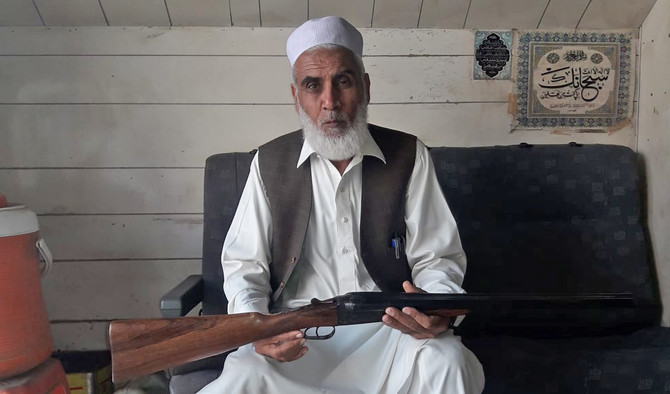
- Relocating market would have an adverse impact on small businesses, owners say
- Thriving manufactory took decades to develop and put Pakistan on the world map
Pakistani conglomerate Engro looks to go global, main investor says
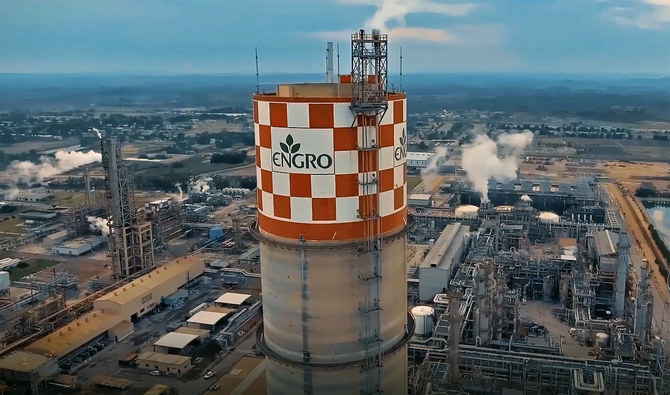
- The expansion plans include looking at telecom infrastructure in the Middle East, North Africa, and Central Asia
- Engro Corp. has a market capitalization of $694 million on the Pakistan Stock Exchange and assets of $2.9 billion
KARACHI: Pakistan’s largest conglomerate, Engro Corp, is looking to expand into new markets, including the Middle East, Central Asia and Africa, the chemicals-to-energy company’s largest investor said on Tuesday.
Speaking to Reuters in a rare interview, Samad Dawood, vice chairman of Dawood Hercules Corp, which owns 40 percent of Engro Corp, said the company was also considering global liquefied natural gas (LNG) opportunities as well as hydrogen energy.
The expansion plans include looking at telecoms infrastructure in the Middle East, North Africa, and Central Asia, while it is looking at Africa to expand its fertilizer businesses, he said.
Engro Corp. has a market capitalization of 193 billion rupees ($694 million) on the Pakistan Stock Exchange and assets of 802 billion rupees ($2.9 billion), according to public data.
The group has businesses across multiple sectors in Pakistan, including energy, fertilizer, telecommunications and consumer goods.
It owns 56 percent of Pakistan’s first LNG terminal, Engro Elengy Terminal Pakistan, which was set up in the southern city of Karachi in 2015. Dutch energy logistics giant Royal Vopak owns the remaining 44 percent.
The terminal fulfils 15 percent of Pakistan’s natural gas demand.
Dawood said Engro will continue to invest in the energy sector despite having sold its coal-based assets, and was exploring new avenues for sustainable energy production.
He said the company was talking to technology providers in the hydrogen energy sector to figure out how to use ammonia as an energy transition solution.
Dawood added that Pakistan was far from being energy-secure and there were plenty of opportunities to invest further in the power sector.
Pakistan has moved toward reliance on LNG after its own domestic gas supplies dwindled fast as consumption in the industrial and residential sectors increased.
’DREAMER’
Dawood said the global push was inspired by his late elder brother Shahzada, who perished last year in the ill-fated Titan’s voyage to explore the Titanic wreckage — an accident that made global headlines when the deep-sea submersible imploded and killed all five people on board.
“He (Shahzada) was much more of a dreamer and pushing us to become more international and building that curiosity and engaging with the outside world,” Dawood said.
The Dawood family also faced a protracted legal ordeal in Pakistan where the company was accused of getting illegal favors from the government.
The case, which lasted years, finally ended last week with the country’s accountability watchdog dropping the case entirely. Dawood says the matter hurt the family deeply and even impacted their businesses and potential investors.
The company’s plans to push ahead are taking shape, Dawood said. On Monday, the boards of Engro and Dawood Hercules approved in principle a restructuring plan to allow them more capital flexibility.
Dawood said the restructuring will allow for participation in “opportunities that the entire economy provides,” adding that the boards wanted the flow of capital to be completely seamless between the two organizations.
He said Engro would be able to expand its investment mandate to include exploring opportunities created by multinational corporations divesting from Pakistan’s troubled markets.
Saudi Arabia’s Crown Prince expected to visit Pakistan ‘any time’ during May — FM Dar
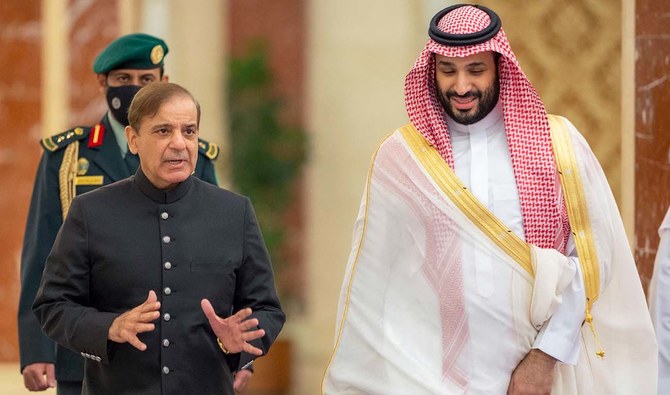
- The development comes after a flurry of high-level engagements between Pakistan and Saudi Arabia in recent weeks
- Both countries have been working closely to increase bilateral trade and investment in several diverse sectors
ISLAMABAD: Ishaq Dar, Pakistan’s deputy prime minister and foreign minister, on Tuesday said the much-awaited visit of Saudi Arabia’s Crown Prince Mohammed bin Salman to Islamabad was on the cards and could materialize “any time” during the month of May.
The statement follows a series of high-level engagements between the two countries, including the visits of Pakistan PM Shehbaz Sharif to the Kingdom and a visit of Saudi Foreign Minister Faisal bin Farhan to Islamabad.
The visit by the Saudi Crown Prince would mark his first trip to Pakistan in the last five years. His previous visit took place in February 2019 during the tenure of former prime minister Imran Khan.
“That visit [of Saudi Crown Prince] is due, which will happen any time during May,” Dar told reporters at a media briefing in Islamabad. “We will receive the final dates from there [Saudi Arabia] and as a foreign ministry, we are in touch and his visit as of now is on the cards.”
The Saudi Crown Prince accepted PM Sharif’s invitation to visit Pakistan during their meeting in Ramadan, according to Dar.
“He [Saudi Crown Prince] said that he will visit Pakistan after the initial government-to-government (G2G) and business-to-business (B2B) meetings,” the Pakistani foreign minister said.
Pakistan and Saudi Arabia have been working closely in recent weeks to increase bilateral trade and investment deals, with Crown Prince Mohammed bin Salman last month reaffirming the Kingdom’s commitment to expedite an investment package of $5 billion.
PM Sharif discussed increasing bilateral trade and investment in his meeting with the Crown Prince during Sharif’s visit to Saudi Arabia on April 6-8, according to Dar.
It was followed by the visit of a Saudi ministerial delegation, led by FM Prince Faisal, to Islamabad on April 15-16, during which Pakistan presented the Saudi delegation with an investment menu that was “meticulously prepared after extensive efforts.”
Following Sharif’s talks with the Crown Prince and other top Saudi officials in Riyadh, a 50-member, high-level delegation, led by the Kingdom’s Assistant Minister of Investment Ibrahim Al-Mubarak, arrived in Pakistan on Sunday to explore investment opportunities in the South Asian country.
“The Saudi Assistant Investment Minister has brought prominent private Saudi companies for B2B meetings as government could only involve in major projects such as Reko Diq, petrochemicals and mining,” he said, adding that his government had aligned Pakistani companies for matchmaking.
“While bilateral trade volume will be bolstered through the private sectors of both sides, the government will facilitate this process as demonstrated by our recent efforts.”
Dar said Pakistan’s future looked “promising” due to the rapid progress made on the bilateral trade and investment agenda, on the directives of the Saudi Crown Prince.
Pakistan and Saudi Arabia enjoy strong trade, defense, and cultural ties. The Kingdom is home to over 2.7 million Pakistani expatriates and serves as a top source of remittances to the cash-strapped South Asian country.
’Wide potential’: Pakistani PM invites Japanese industrialists to invest in electric vehicle industry
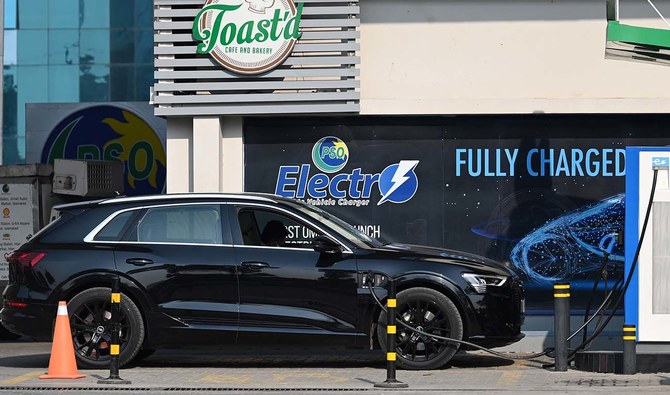
- The delegation, led by Japan’s Ambassador Wada Mitsuhiro, met PM Shehbaz Sharif to discuss various opportunities in Pakistan
- PM Sharif says his government has formed committee to resolve issues faced by Japanese firms expanding businesses in Pakistan
ISLAMABAD: Prime Minister Shehbaz Sharif on Tuesday met with a delegation of Japanese industrialists in Islamabad and urged them to invest in Pakistan’s electric automotive industry, Sharif’s office said, amid country’s push to attract foreign investment.
The delegation, led by Japan’s Ambassador to Pakistan Wada Mitsuhiro, met the prime minister to discuss various opportunities in Pakistan, according to PM Sharif’s office.
The Pakistan premier noted that Japan and Pakistan were longstanding friends and the two countries should further promote trade and investment ties in various sectors.
“There is a wide potential for investment in the electric vehicle industry in Pakistan and Japanese companies with the best technology can take full advantage of it,” Sharif was quoted as saying by his office.
“All problems faced by Japanese industrialists and businessmen will be overcome together.”
He noted that his government had formed a committee to resolve the issues faced by Japanese companies, who were expanding their businesses in Pakistan.
During the meeting, the Japanese ambassador informed the prime minister about the arrival of a delegation of 20 well-known Japanese companies to Pakistan in July, which would prove to be an important milestone for the promotion of investment and trade between the two countries.
“The delegation informed the Prime Minister that Japanese companies have started local production of hybrid vehicles in Pakistan,” Sharif’s office said. “The Prime Minister welcomed this move.”
The development comes amid Pakistan’s efforts to attract foreign investment to keep the frail $350 billion South Asian economy afloat.
The cash-strapped nation last month completed its $3 billion International Monetary Fund (IMF) program which helped avert a default last year, but the government of PM Sharif has stressed the need for a fresh, longer-term program.
Pakistan is expected to seek at least $6 billion and request additional financing from the Fund under the Resilience and Sustainability Trust.
PM Sharif says Saudi business delegation’s visit to benefit Pakistan’s economic future
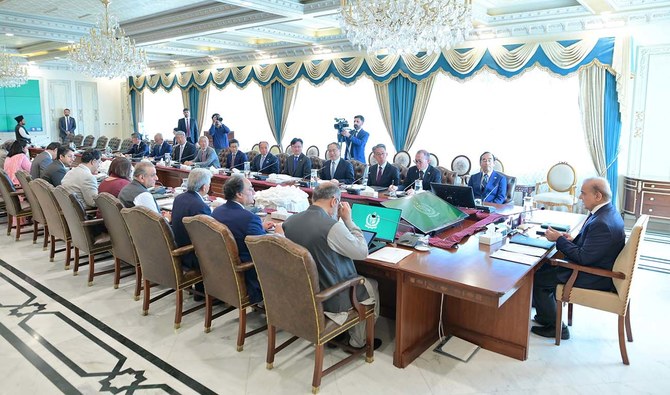
- The prime minister says the Saudi minister leading the delegation described it as ‘a new era’ for Pakistan
- Pakistan is seeking foreign investment to navigate a path to economic recovery as it seeks another IMF bailout
ISLAMABAD: Prime Minister Shehbaz Sharif expressed confidence on Tuesday the Saudi business delegation’s visit to Pakistan would prove beneficial for his country while applauding his cabinet ministers for playing a constructive role in their dealings with the visiting investors.
The delegation, which comprised representatives of 30-35 Saudi companies, was led by the kingdom’s Saudi Assistant Minister of Investment Ibrahim Al-Mubarak and arrived in Pakistan on Sunday.
Its members held several business-to-business meetings to explore investment opportunities in various economic sectors of the country.
The prime minister said in the opening remarks of the cabinet meeting the delegation was satisfied with its engagements in Pakistan before returning to the kingdom. He particularly mentioned the head of the delegation, saying he praised the performance of Pakistani ministers.
“He said, ‘We are very satisfied and happily returning.’ And he said, ‘I will report that we have seen a new era in Pakistan.’ In this, the commerce minister has a very big role, as does the ministers of petroleum and finance,” the PM told the cabinet meeting.
“It augurs very well for our future,” he added.
The kingdom’s business delegation’s visit to Islamabad followed Saudi Foreign Minister Prince Faisal bin Farhan’s visit to Islamabad last month, when he was briefed by the authorities on various avenues to invest in the country.
Pakistan is trying to navigate a path to economic recovery by securing an International Monetary Fund bailout.
It also needs foreign investment to help fight a chronic balance of payments crisis.
Pakistan expecting investment in port infrastructure by global shipping giant Maersk — minister
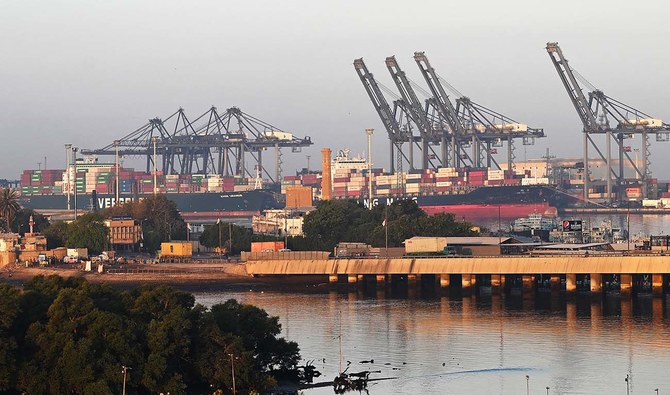
- AP Moller-Maersk has a market share of around 20 percent in Pakistan’s containerized import-export activities
- Qaiser Ahmed Sheikh says there is a lot of interest in Pakistan’s port as a global hub for transshipment
KARACHI: Pakistan is expecting investment from a Denmark-based global shipping giant, AP Moller–Maersk (Maersk), in its port terminal and infrastructure, the Pakistani maritime affairs minister said on Tuesday, amid growing global interest in Pakistani ports.
The statement comes more than a week after Maersk Chief Executive Officer Keith Svendsen’s visit to Pakistan, where he met top officials to explore opportunities in Pakistan’s maritime sector.
Maritime Affairs Minister Qaiser Ahmed Sheikh told Arab News the Danish shipping firm was interested in investing in a terminal and port as well as allied infrastructure, including connecting bridges.
“We had very good discussions with them and they had shown eagerness and told us that they will submit proposal in a few days,” he said. “They want to take a terminal. There is some area where there is depth in the sea, where big ships can be anchored.”
Maersk has grown into a leading provider of logistics and supply-chain services across Pakistan. It has around 20 percent market share in Pakistan’s containerized import-export activities, according to Pakistan’s information ministry.
In January, the Danish shipping firm announced new smart logistics and warehouse facilities in China, Norway and Pakistan.
“With a vast network of warehousing and depot facilities across the country, including our flagship logistics hub in Port Qasim, Karachi — a sprawling 27-acre complex encompassing over 650,000 square feet of warehouse space — we ensure unparalleled support to Pakistani exporters and importers,” the shipping company said in a written response to Arab News.
“In total, Maersk now operates over a 1.5 million square feet footprint across 7 cities in Pakistan.”
Sheikh said many companies were interested in investing in the Karachi Port Trust (KPT) despite a limited space available there.
“We have limited space available in KPT and many, including foreign, companies are taking interest in it, particularly in the deep-water areas where water depth is high and we have the location,” he said.
“The point is that there is a lot of interest in Pakistan’s port right now because they are seeing this as a global hub for transshipment and they will also run the feeder vessels in the Gulf from here.”
To a question about a visiting Saudi delegation, the maritime affairs minister said “there are many breakthroughs” during the visit. “They are looking for areas of mutual interest which both sides can benefit from,” he added.
The South Asian nation has already signed an agreement with Abu Dhabi (AD) Ports Group which is investing about $395 million for the development of a container and cargo terminal under a government-to-government (G2G) agreement between the United Arab Emirates and Pakistan.















